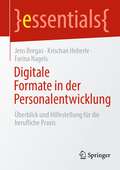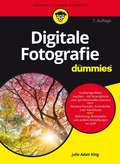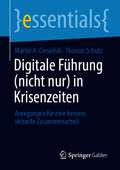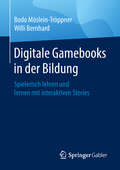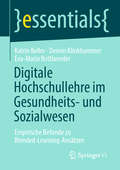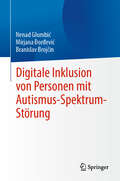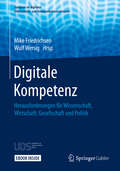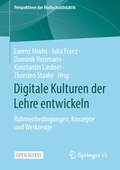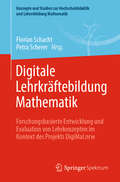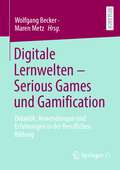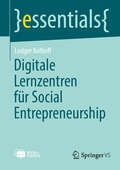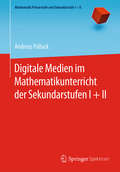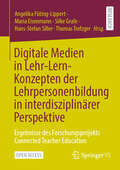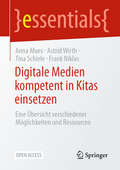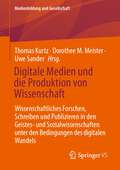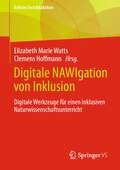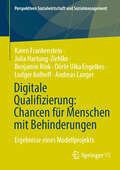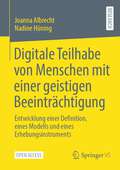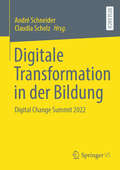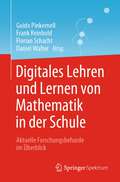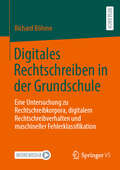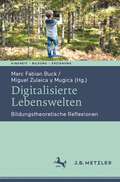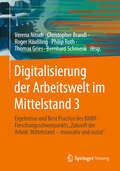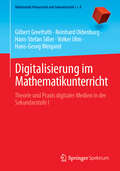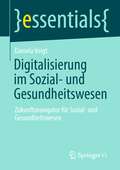- Table View
- List View
Digitale Formate in der Personalentwicklung: Überblick und Hilfestellung für die berufliche Praxis (essentials)
by Krischan Heberle Jens Bregas Farina NagelsDas durch die Pandemie veränderte Arbeiten hat auch die Personalentwicklung veranlasst, ihre Methoden und Arbeitsweisen umzustellen. Digitalisierung bietet sich seitdem als Lösung für viele Fragestellungen an. In diesem essentials-Band werden daher exemplarisch drei Themengebiete der Personalentwicklung (Eignungsdiagnostik, Teamentwicklung und Führungskräfteentwicklung) als digitale Varianten vorgestellt, die in der Corona-Krise relativ kurzfristig umgesetzt wurden. Damit richtet sich dieser Band an Praktiker, die Anknüpfungspunkte für die eigene Digitalisierung ihrer Entwicklungsarbeit suchen und Hindernisse umgehen möchten oder ihr bisheriges Vorgehen mit anderen abgleichen wollen.
Digitale Fotografie für Dummies (Für Dummies)
by Julie Adair KingOb Sie mit einer billigen Kompaktkamera, einer High-End-Kamera mit zahlreichen Extras, einem Smartphone oder einer Action-Cam fotografieren - mit ein paar einfachen Tricks können immer aus durchschnittlichen Fotos großartige Bilder werden. Digitale Fotografie für Dummies versorgt Sie mit genau diesen Tricks - und ein paar ausgefalleneren Ideen. Damit können Sie sich einen Fotokurs oder das Lesen der Gebrauchsanweisung Ihrer Kamera sparen. Finden Sie heraus, was die Kamera in Ihrer Hand kann und was sie nicht kann. Erlernen Sie einfache Techniken, die mit jedem Kameratyp funktionieren. Erfahren Sie das Geheimnis der richtigen Belichtung.
Digitale Führung: Anregungen für eine bessere, virtuelle Zusammenarbeit (essentials)
by Martin A. Ciesielski Thomas SchutzMartin A. Ciesielski und Thomas Schutz vermitteln in diesem essential kompakt fundiert, praxisnah und durchaus humorvoll, wie sich in #VUCArona-Zeiten digitale Führung und Zusammenarbeit gestalten und entwickeln lassen. Neben der Entwicklung digitaler Führungskompetenz braucht es auch verstärkte, virtuelle Präsenz, mehr Resonanz und digitale Achtsamkeit. Anhand von Praxis-Beispielen und mit Hilfe von Social Prototyping zeigen sie konkrete Methoden und Möglichkeiten der Umsetzung auf.
Digitale Gamebooks in der Bildung: Spielerisch Lehren Und Lernen Mit Interaktiven Stories
by Bodo Möslein-Tröppner Willi BernhardSerious Games und spielerisches Lernen erfreuen sich im Bildungsbereich einer immer größeren Nachfrage. Dies ist nicht verwunderlich, schließlich praktizieren alle Menschen das Spiel in unterschiedlichen Weisen gleich von Geburt an. Wir wissen heute, dass Spielen eine der effektivsten Lernformen ist.Kollaborative digitale Gamebooks ermöglichen es, als Lehrpersonen auf eine solche Nachfrage zu reagieren, ohne externe Spieldesigner und Software-Entwickler herbeiziehen zu müssen. Inhaltlich können sie damit ihre eigenen Wissensgebiete in Eigenregie spielerisch, didaktisch und technisch aufbereiten, wobei das Spielgeschehen nur durch ihre eigenen Ideen begrenzt ist und nicht etwa durch technische Gegebenheiten. Beim kollaborativen Gamebook handelt es sich um ein digitales interaktives Spiel bei dem in der kompletten Spielumgebung durch Textkomponenten ein Vorstellungsbild im Kopf des Spielers erzeugt wird – wie bei einem Buch. Der Leser (= der Lernende) nimmt die Rolle des Spielers ein und kann dabei direkten Einfluss auf die Handlung des Geschehens nehmen. Im Spielverlauf stößt er immer wieder auf andere Spieler, mit denen er kollaborieren muss, um vorwärts zu kommen. Die Handlungen im Spiel können vom Lernenden direkt beeinflusst werden. Auf diese Weise wird Wissen spielerisch erfahren, motivierend erlernt und praktisch angewendet.In diesem Buch wird erstmals das neue Format des Gamebooks für den Unterricht im Game-based-learning-Kontext an (Hoch-)Schulen vorgestellt. Die Integration spielerischer, kollaborativer Elemente sowie das Konzept der Selbstwirksamkeit im Bildungskontext ist weltweit einzigartig. Die Erstellung des kollaborativen digitalen Gamebooks ist direkt durch die Lehrperson möglich; Informatiker und Gameentwickler werden nicht benötigt.
Digitale Hochschullehre im Gesundheits- und Sozialwesen: Empirische Befunde zu Blended-Learning-Ansätzen (essentials)
by Katrin Keller Dennis Klinkhammer Eva-Maria RottlaenderBlended-Learning-Ansätze können im Hochschulkontext die Lehr-Lern-Settings um digitale Elemente erweitern und ergänzen. Um die Synergieeffekte systematisch aufzuschlüsseln, wird in diesemessential der Frage nachgegangen, wie Präsenzvorlesung, Webinarvorlesung und Videovorlesung im unmittelbaren Vergleich unter kontrollierten Rahmenbedingungen auf Lernende im akademischen Lehr-Lern-Setting einwirken können. Dies wird mit einer sekundären Fragestellung zur Kompetenzentwicklung von Studierenden analysiert. Sowohl die Lehrmethodik und -didaktik, als auch die bewusste Entscheidung für den Einsatz von digitalen Medien zur Ausgestaltung von akademischen Lehr-Lern-Settings stehen dabei im Fokus der Analyse und der Handlungsempfehlungen.
Digitale Inklusion von Personen mit Autismus-Spektrum-Störung
by Nenad Glumbić Mirjana Đorđević Branislav BrojčinDieses Buch untersucht Chancen und Hindernisse für die digitale Inklusion von Personen mit Autismus-Spektrum-Störung (ASS). Es behandelt die grundlegenden Anforderungen der „digitalen Gesellschaft“ sowie Konzepte der digitalen Inklusion (und Exklusion), der digitalen Teilhabe und der digitalen Kluft bei Behinderungen und bietet Unterstützung für Personen mit Autismus bei der Mitgestaltung digitaler Geräte. Das Buch diskutiert die Anwendung digitaler Technologien in verschiedenen Kontexten, einschließlich Bildung, Freizeitaktivitäten, Gemeinschaftsleben, alltäglichen Lebensfähigkeiten und Beschäftigung von Personen mit Autismus. Behandelte Bereiche umfassen: Computerbasierte Interventionen zur Sprachentwicklung, sozialen Kommunikation, exekutiven Funktionen und anderen Fähigkeiten bei Kindern mit Autismus. Digitale Gesundheitsinterventionen für Personen mit ASS. Risiken für Personen mit ASS im Internet (z.B. übermäßige Nutzung, süchtiges Verhalten und Cybermobbing). Nutzung digitaler Technologien zur Simulation von Vorstellungsgesprächen und zur Vermittlung von Arbeitsfähigkeiten. Nutzung digitaler Technologien in Selbstvertretungsaktivitäten von Personen mit Autismus. Digitale Inklusion von Personen mit Autismus-Spektrum-Störung ist ein unverzichtbares Nachschlagewerk für ForscherInnen, ProfessorInnen, DoktorandInnen, KlinikerInnen sowie verwandte TherapeutInnen und Fachleute in der klinischen Kinder- und Schulpsychologie, der Sozialarbeit, der Verhaltenstherapie/Rehabilitation, der Pädiatrie, der Physiotherapie, der Ergotherapie, der Sprachtherapie, der Neurologie, der Sonderpädagogik, der Kinder- und Jugendpsychiatrie sowie der Entwicklungspsychologie.
Digitale Kompetenz: Herausforderungen für Wissenschaft, Wirtschaft, Gesellschaft und Politik (Synapsen im digitalen Informations- und Kommunikationsnetzwerk)
by Mike Friedrichsen Wulf WersigDieses Buch präsentiert Konzepte, Lösungsansätze und Visionen aus unterschiedlichen Perspektiven, um die digitale Kompetenz bei Mitarbeitern und Führungskräften zu fördern. Es gilt auf die sich verändernden und steigenden Anforderungen an die Fachkräfte und die neuen Berufsbilder, die zu einer wachsenden Flexibilisierung und Digitalisierung des Arbeitsmarktes führen, angemessen zu reagieren. Somit besteht dringender Handlungsbedarf bei der Aus- und Weiterbildung in Digitalthemen für Mitarbeiter und Führungskräfte.Die Autoren zeigen, dass durch die internationale Verflechtung im Rahmen der Globalisierung und den daraus resultierenden Wettbewerbsdruck das Vorhandensein von digitaler Kompetenz eine Kernvoraussetzung für eine zukunftsweisende Entwicklung ist. Digitale Kompetenzen versetzen Mitarbeiter von Wirtschaftsunternehmen, Behörden und Bildungseinrichtungen in die Lage, digitale Technologien anzuwenden und darüber hinaus die digitale Transformation von Geschäftsprozessen und institutionellen Abläufen mit voranzutreiben.Der Inhalt• Was bedeutet digitale Kompetenz und was wird konkret benötigt?• Worin unterscheidet sich digitale Kompetenz von dem Buzz-Word Medienkompetenz?• Welchen Stellenwert hat die digitale Kompetenz in Unternehmen, Behörden und Bildungseinrichtungen?• Welche politischen Maßnahmen sind erforderlich, um digitale Kompetenzen aufzubauen?• Welche digitalen Kompetenzen müssen durch das Bildungssystem geschaffen werden?• Welche Veränderungen im Bildungssystem sind erforderlich?• Welche Handlungsoptionen und Lösungskonzepte gibt es?
Digitale Kulturen der Lehre entwickeln: Rahmenbedingungen, Konzepte und Werkzeuge (Perspektiven der Hochschuldidaktik)
by Dominik Herrmann Thorsten Staake Lorenz Mrohs Julia Franz Konstantin LindnerDie Digitalisierung sowie der damit einhergehende Wandel von Gesellschaft und Arbeitsleben verändern die Anforderungen an Hochschulen, Lehrende und Studierende. Dabei entsteht eine neue Kultur digitaler Lehre mit großen Chancen und Herausforderungen für alle Akteursgruppen.Die Beiträge des vorliegenden Open-Access-Sammelbandes beleuchten die Entstehung digitaler Kulturen in der Hochschullehre und stellen neue Konzepte, Gestaltungsmöglichkeiten sowie Evaluationsergebnisse digitaler Lehr-Lern-Wege vor. Vor diesem Hintergrund werden in den Ausführungen auch digitale Werkzeuge und deren Anwendung sowie Weiterentwicklung in den Blick genommen – sowohl für reine Online-Formate als auch für Mischformen aus digitalen und klassischen Lehransätzen.
Digitale Lehrkräftebildung Mathematik: Forschungsbasierte Entwicklung und Evaluation von Lehrkonzepten im Kontext des Projekts DigiMal.nrw (Konzepte und Studien zur Hochschuldidaktik und Lehrerbildung Mathematik)
by Florian Schacht Petra SchererDieser Sammelband lotet die Möglichkeiten und Grenzen digital gestützter Maßnahmen für das Lehramtsstudium Mathematik – insbesondere im Primarbereich und in den Studiengängen des Lehramts Sonderpädagogik – aus. Ziel der entwicklungs- und forschungsbezogenen Beiträge ist es, die Gestaltung und Weiterentwicklung des Lehramtsstudiums mit digitalen Formaten voranzutreiben, deren vielfältige Potentiale aufzuzeigen und somit für Studierende die Zugänge zum Fach und zur Didaktik der Mathematik wirksam zu erweitern. Behandelt werden insbesondere folgende Fragen: Welche Potentiale und Grenzen bieten digital gestützte Lehr-Lern-Materialien im Lehramtsstudium Mathematik? Welche Konsequenzen ergeben sich aus dem Einsatz für die (Um-)Gestaltung entsprechender Lehrveranstaltungen? Welche empirischen Erkenntnisse lassen sich aus dem praktischen Einsatz ableiten? Die Beiträge beziehen sich sowohl auf fachbezogene Inhalte des Studiums (z. B. Geometrie, Arithmetik, Kombinatorik) als auch unterrichtspraktische Ausbildungsanteile zu fachdidaktischen Querschnittsthemen (z. B. Sprachbildung, Heterogenität), die mit digital gestützten Lehr-Lernmaterialien im Lehramtsstudium adressiert werden. Die Darstellungen orientieren sich an entwickelten Materialien, die in unterschiedlichen Lehrveranstaltungen der ersten Phase der Lehramtsausbildung (universitätsübergreifend) eingesetzt, evaluiert und ggf. überarbeitet wurden. Auf diese Weise entstehen sowohl fundierte Konzepte als auch theoriegeleitete und empirisch gestützte Beispiele für die Lehramtsausbildung. Chancen der Nutzung digitaler Formate – sowohl in der Distanz- als auch in der Präsenzlehre – können damit besser verstanden und praktisch weiterentwickelt werden.
Digitale Lernwelten – Serious Games und Gamification: Didaktik, Anwendungen und Erfahrungen in der Beruflichen Bildung
by Wolfgang Becker Maren MetzDer Sammelband soll dazu beitragen, den Stellenwert von Serious Games und Gamification als wichtige und nachhaltige Methode in der beruflichen Aus- und Weiterbildung (Personalqualifikation, Personalentwicklung) noch stärker herauszuarbeiten. Gleichzeitig sollen bedeutsame und zukunftsweisende Lernentwicklungsperspektiven in digitalen Lernwelten aufgezeigt werden. Die enge Verknüpfung von didaktischen Aspekten und Lerneffekten, die aus dem praktischen Einsatz von Serious Games resultieren können, grenzt die Publikation von bislang vorliegenden Veröffentlichungen zu dieser Thematik ab, wie auch die Darstellung des praktischen Einsatzes der Serious Games und deren Evaluation.
Digitale Lernzentren für Social Entrepreneurship (essentials)
by Ludger KolhoffIn diesem Essential mit begleitendem Online-Kurs wird das Erasmus+-Projekt „Learning Centers for Social Entrepreneurs in the Digital Era&“ vorgestellt. Sechs europäische Partner arbeiten zusammen, um insbesondere benachteiligte Personengruppen in ihren unternehmerischen Kompetenzen zu stärken. Durch digitale Lernmaterialien und professionelle Betreuung erhalten diese Zielgruppen die Chance, innovative Geschäftsmodelle zu entwerfen. Dafür wurden praxisnahe Trainingskonzepte entwickelt, die sich in einem Innovationsbuch, spezialisierten Lehr- und Lernmodulen sowie auf einer modernen Online-Plattform vereinen. Der begleitende Online-Kurs unterstützt Interessierte dabei, ein individuell zugeschnittenes Social-Entrepreneurship-Programm zu erstellen. Ein Schwerpunkt liegt darauf, vulnerable Gruppen in unternehmerische und soziale Innovationsprozesse einzubinden und ihre Teilhabe zu fördern.
Digitale Medien im Mathematikunterricht der Sekundarstufen I + II (Mathematik Primarstufe und Sekundarstufe I + II)
by Andreas PallackEin Blick in aktuelle Bildungsstandards und Lehrpläne zeigt: Die Nutzung digitaler Medien im Mathematikunterricht wird immer stärker eingefordert und geht heute weit über den Einsatz wissenschaftlicher Taschenrechner hinaus. Zukünftige Lehrerinnen und Lehrer müssen sich deswegen notwendig bereits im Rahmen ihrer Ausbildung mit digitalen Medien auseinandersetzen. Entsprechend wird hier ein Lehrwerk angeboten, das, orientiert an den Funktionalitäten digitaler Medien, Chancen und Risiken der Nutzung in mathematikpädagogischen Kontexten strukturiert darstellt. Zentrales Anliegen ist die Entwicklung von Medienkompetenz mit Blick auf das Lehren und Lernen im Fach Mathematik. Das Lehrwerk basiert auf erprobten und bewährten Veranstaltungen im Rahmen der Lehrerbildung.
Digitale Medien in Lehr-Lern-Konzepten der Lehrpersonenbildung in interdisziplinärer Perspektive: Ergebnisse des Forschungsprojekts Connected Teacher Education
by Hans-Stefan Siller Thomas Trefzger Angelika Füting-Lippert Maria Eisenmann Silke GrafeDer open access Sammelband zeigt auf, wie digitalisierungsbezogene Kompetenzen von Studierenden und Dozierenden der Lehrpersonenbildung auf Basis interdisziplinären Zusammenwirkens von Bildungswissenschaften und Fachdidaktiken unter besonderer Berücksichtigung der Mensch-Computer-Interaktion gefördert werden können. Zehn Forschungsprojekte präsentieren ihre innovativen und wissenschaftlich fundierten Lern-Lehr-Konzepte, die sie gestaltet, implementiert und evaluiert haben. Hierbei kamen u.a. Augmented und Virtual Reality, Simulationen und adaptive Lernumgebungen zum Einsatz.
Digitale Medien kompetent in Kitas einsetzen: Eine Übersicht verschiedener Möglichkeiten und Ressourcen (essentials)
by Frank Niklas Anna Mues Astrid Wirth Tina SchieleDigitale Medien sind fester Bestandteil der Lebenswelt von Kindern und der frühpädagogischen Arbeit. Das frühe Erlernen von Medienkompetenzen, die Professionalisierung pädagogischer Fachkräfte und qualitativ hochwertige medienpädagogische Arbeit sind deshalb von zentraler Bedeutung. Dieses Open Access essential zur digitalen Medienbildung bietet wissenschaftlich fundierte Informationen und praktische Anwendungen für den Einsatz von Tablets und Apps mit jungen Kindern. Dabei werden konkrete Ideen sowie spielerische und kindgerechte Praxis-Tipps vermittelt.
Digitale Medien und die Produktion von Wissenschaft: Wissenschaftliches Forschen, Schreiben und Publizieren in den Geistes- und Sozialwissenschaften unter den Bedingungen des digitalen Wandels (Medienbildung und Gesellschaft #47)
by Uwe Sander Dorothee M. Meister Thomas KurtzDer Band greift Fragen nach Transformationen des Forschungs- und Wissenschaftsproduktionsprozesses durch Digitalisierung in den Geistes- und Sozialwissenschaften auf. Es geht neben anderen um die Frage, wie sich die Produktion von Wissenschaft mit der Einführung des Computers, des Internets, von Softwareentwicklungen, Algorithmen bis hin zu Künstlicher Intelligenz verändert hat, wobei nicht nur allgemein das Ziel der Publikation wissenschaftlicher Erkenntnisse zu berücksichtigen ist. Vielmehr geht es um all die Prozesse und Reflexionen, die zu diesem Produktionsprozess hinführen.
Digitale NAWIgation von Inklusion: Digitale Werkzeuge für einen inklusiven Naturwissenschaftsunterricht (Edition Fachdidaktiken)
by Elizabeth Marie Watts Clemens HoffmannDer Band dokumentiert die Tagung „Digitale NAWIgation von Inklusion“ und bindet Theorie an Praxis. Als eine erste nationale Konferenz stellten sich Veranstalter und Beitragende der Frage, wie mit digitalen Werkzeugen im Naturwissenschaftsunterricht inklusive Lernumgebungen geschaffen werden können. Entstanden ist ein Überblick über aktuelle Bestrebungen in Deutschland, der Schweiz und den USA mit Fokus auf der Verbindung von Theorie und Praxis sowie der Nutzbarmachung der erprobten Ansätze für die Umsetzung in Schule und Unterricht.
Digitale Qualifizierung: Ergebnisse eines Modellprojekts (Perspektiven Sozialwirtschaft und Sozialmanagement)
by Andreas Langer Ludger Kolhoff Julia Hartung-Ziehlke Karen Frankenstein Benjamin Rink Dörte Ulka EngelkesDigitale Bildungsangebote können für Menschen mit Behinderungen eine entscheidende Rolle spielen, um grundlegende berufliche Kompetenzen zu erwerben. Das Modellprojekt "diBa" hat sich intensiv mit dieser Thematik befasst. Es konzentrierte sich auf die Entwicklung und Implementierung digitaler Bildungsangebote, die speziell auf die Bedürfnisse von Menschen mit Behinderungen zugeschnitten sind.
Digitale Teilhabe von Menschen mit einer geistigen Beeinträchtigung: Entwicklung einer Definition, eines Modells und eines Erhebungsinstruments
by Joanna Albrecht Nadine HüningIn diesem Open-Access-Buch wird die Entwicklung einer Definition, eines Modells und eines Erhebungsinstruments Digitaler Teilhabe von Menschen mit geistiger Beeinträchtigung beschrieben. Eine geistige Behinderung wird als Konstrukt verstanden, das durch die ganzheitliche Wechselwirkung zwischen personenbezogenen Faktoren, Gesundheitsproblemen sowie umweltbezogenen Barrieren entsteht. Für die Identifikation der Hilfebedarfe zur Realisierung von Teilhabe ist die ganzheitliche Betrachtung von heterogenen Ursachen, Formen und Ausprägungen unverzichtbar. Der Anspruch auf Teilhabe ist gesetzlich verankert, jedoch führt die digitale Transformation zu neuen gesellschaftlichen Ungleichheiten, die sich als Digital Divide manifestieren. Trotz geringer und heterogener Datenlage zu Ungleichheiten bei Menschen mit (geistiger) Beeinträchtigung sind bereits Hinweise auf eine Digital Disability Divide zu erkennen. Um dieses Forschungsdesiderat aufzuarbeiten, bedarf es eines einheitlichen Begriffsverständnisses Digitaler Teilhabe. Auch müssen Einflussfaktoren eruiert werden, um Ansätze zur Förderung Digitaler Teilhabe zu entwickeln und darauf aufbauend ein Erhebungsinstrument zu entwickeln. Entsprechend verfolgt diese Forschungsarbeit die Entwicklung einer Definition,eines Modells und Erhebungsinstruments Digitaler Teilhabe von Menschen mit geistiger Beeinträchtigung in der Eingliederungshilfe.
Digitale Transformation in der Bildung: Digital Change Summit 2022
by André Schneider Claudia ScholzDie Digital Change Summit bietet als Konferenzformat der Hochschule Mittweida eine jährliche Plattform für Wissenschaft sowie Praxis und ermöglicht spannende Einblicke zu Themen der digitalen Transformation.Im Tagungsband "Digitale Transformation in der Bildung" werden aktuelle Forschungsergebnisse, Good Practice Fälle sowie Trends aus dem Bereich des digitalen Wandels in der Bildung vorgestellt und diskutiert.
Digitales Lehren und Lernen von Mathematik in der Schule: Aktuelle Forschungsbefunde im Überblick
by Florian Schacht Daniel Walter Frank Reinhold Guido PinkernellMit diesem Buch legen die Herausgeber einen umfassenden Überblick über den aktuellen Forschungsstand zur Digitalisierung des Lehrens und Lernens im schulischen Mathematikunterricht vor. Es soll Forschenden und Lehrkräften eine Orientierung für die Reflexion und Weiterentwicklung digitaler Werkzeuge und Medien und zugleich richtungsweisende Antworten auf die Frage geben, wie Digitalisierung sinnvoll gelingen kann, ohne zum Selbstzweck zu werden. Hierzu stellt eine Vielzahl von Autorenteams das Thema aus verschiedenen Blickwinkeln dar:Übergreifende Perspektiven: Theoretische und psychologische Grundlagen, Lehrkräfteprofessionalisierung, virtuelle Realität, digitale Lernumgebungen und WerkzeugeZentrale inhaltsorientierte Perspektiven: Arithmetik, Algebra, Funktionen, Geometrie und Stochastik sowie informatisches DenkenWichtige prozessorientierte Perspektiven: Modellieren, Argumentieren, Darstellen und Kommunizieren Ein abschließender Ausblick zu den „Future Directions“ in englischer Sprache macht deutlich, dass die Digitalisierung des Lehrens und Lernens nie abgeschlossen sein kann, sondern jeder gegenwärtige Stand auf die Zukunft bezogen sein muss.
Digitales Rechtschreiben in der Grundschule: Eine Untersuchung zu Rechtschreibkorpora, digitalem Rechtschreibverhalten und maschineller Fehlerklassifikation
by Richard BöhmeDer Erwerb der Rechtschreibung ist eine äußerst anspruchsvolle Aufgabe. Digitale Medien haben das Potenzial, Schüler*innen dabei durch adaptive Angebote zu unterstützen. Voraussetzung dafür sind Machine-Learning-Verfahren, die Rechtschreibfehler von Schüler*innen zuverlässig klassifizieren. Allerdings bestehen in diesem Zusammenhang einige Entwicklungs- und Forschungsdesiderate. Die folgenden wurden adressiert: Zunächst wurden gängige Grund- und Orientierungswortschätze einer umfassenden Korpusanalyse unterzogen. In den Ergebnissen zeigt sich, dass zwar ein Großteil der Wörter graphematisch, aber nur ein Bruchteil rein phonematisch herzuleiten ist. Unter Verwendung der analysierten Wörter und einer eigens entwickelten Rechtschreib-App wurde das digitale, prozessbezogene Rechtschreibverhalten von Schüler*innen mit hoher und niedriger Rechtschreibkompetenz untersucht. Die Ergebnisse machen deutlich, dass sich die Schüler*innen u.a. in ihrer Fehlersensibilität, ihrer aktiven Auseinandersetzung mit Fehlerkorrekturen und ihrem systematischen Vorgehen beim Hypothesentesten unterscheiden. Die fehlerhaften Verschriftungen der Schüler*innen wurden wiederum dafür genutzt, um Machine-Learning-Algorithmen zu trainieren. Die Evaluation zeigt, dass Rechtschreibfehler damit äußerst zuverlässig klassifiziert werden können.
Digitalisierte Lebenswelten: Bildungstheoretische Reflexionen (Kindheit – Bildung – Erziehung. Philosophische Perspektiven)
by Marc Fabian Buck Miguel Zulaica y MugicaDigitale Technologien sind nicht mehr Teil utopischer oder dystopischer Beschreibungen, sondern selbstverständlicher Teil der heutigen Lebenswelt. Diese bildet den Boden für Sozialisations-, Bildungs- und Erziehungsprozesse. Im Zentrum des Bandes steht diese postdigitale Alltäglichkeit, die sich begleitet von Sachzwängen, Ernüchterungen, Normalisierungen und Pragmatik etabliert hat und hier bildungstheoretisch reflektiert wird. Untersucht werden lebensweltliche Differenzerfahrungen, die sich aus der konkreten Praxis und ihren Brüchen ergeben, hinsichtlich bedeutsamer Fragen nach Formen und Orten pädagogischen Handelns, nach Erfahrbarkeit von Anderen und Anderem, nach Verantwortung, Sozialität, Subjektivität und Unbestimmtheit. Der Band zielt auf eine Aktualisierung bildungstheoretischen Denkens, das sich anschlussfähig erweist an lebensweltliche Bezüge in einer sich rasch verändernden Welt.
Digitalisierung der Arbeitswelt im Mittelstand 3: Ergebnisse und Best Practice des BMBF-Forschungsschwerpunkts "Zukunft der Arbeit: Mittelstand – innovativ und sozial"
by Philip Roth Roger Häußling Verena Nitsch Thomas Gries Christopher Brandl Bernhard SchmenkDieses Buch zeigt, wie das Innovationspotenzial kleiner und mittlerer Unternehmen im digitalen Wandel der Arbeitswelt durch Maßnahmen der Arbeitsgestaltung und -organisation gestärkt werden kann. Die Beiträge der Autor*innen aus Industrie und Forschung umfassen sowohl Ergebnisse als auch Best-Practice-Beiträge der Verbundprojekte des BMBF-Forschungsschwerpunkts "Zukunft der Arbeit: Mittelstand – innovativ und sozial".In den Themenbereichen • Unterstützung strategischer Entscheidungsprozesse zur Digitalisierung von Unternehmen • Weiterbildungs- und Qualifizierungsangebote für und durch Digitalisierung• Assistenzsysteme zur Unterstützung in der digitalisierten Arbeitswelt und der digitalen Gestaltung von Arbeit• Gestaltung inner- und überbetrieblicher Kollaboration von Menschen durch virtuelle Umgebungenbeschreiben die vorgestellten Beiträge einerseits ein großes Spektrum technischer, organisatorischer und personeller Entwicklungen und andererseits auch deren Umsetzung in betrieblichen Anwendungsfällen im Sinne von Best Practice.
Digitalisierung im Mathematikunterricht: Theorie und Praxis digitaler Medien in der Sekundarstufe I (Mathematik Primarstufe und Sekundarstufe I + II)
by Gilbert Greefrath Hans-Stefan Siller Hans-Georg Weigand Reinhard Oldenburg Volker UlmDieses Buch zeigt, wie verschiedene digitale Medien als Lern- und Lehrhilfsmittel in den Mathematikunterricht integriert werden können: Es stellt theoretische Überlegungen und Konzeptionen dar und zeigt an vielen unterrichtspraktischen Beispielen, wie Taschenrechner, Laptop und Smartphone mit der entsprechenden Software und dem Internet im Unterricht eingesetzt werden können. Das dargestellte Programm-Spektrum reicht von Computeralgebrasystemen über dynamische Geometriesysteme, Tabellenkalkulationen und 3D-Druck bis hin zu interaktiven Lernumgebungen, auch mit Virtueller Realität und Augmented Reality. Der Einsatz der Medien orientiert sich dabei stets am zentralen Ziel, die Entwicklung vielfältiger Kompetenzen bei Schülerinnen und Schülern nachhaltig zu unterstützen. Das Buch wendet sich an Studierende des Lehramts Mathematik, an Referendarinnen und Referendare sowie praktizierende Lehrkräfte. Es konzentriert sich auf zentrale Inhalte der Sekundarstufe I – also Zahlen, Algebra, Funktionen, Geometrie sowie Daten und Zufall. Um Leserinnen und Leser zur eigenständigen Auseinandersetzung mit digitalen Medien anzuregen, sind am Ende jedes Kapitels Aufgaben zur individuellen Bearbeitung angefügt. Materialien zu den Inhalten, vor allem interaktive Elemente, sind auf einer eigenen Internetseite zusammengestellt. Das vorliegende Buch ist eine vollständige Neubearbeitung des Buches „Computer im Mathematikunterricht“ von Hans-Georg Weigand und Thomas Weth aus dem Jahr 2002.
Digitalisierung im Sozial- und Gesundheitswesen: Zukunftsnavigator für Sozial- und Gesundheitswesen (essentials)
by Daniela VoigtDie Digitalisierung als einer der bedeutendsten Wandel der Gegenwart verändert signifikant Lebens- und Arbeitsbereiche. Besonders im Sozial- und Gesundheitswesen modifizieren sich Kunden- und Klientenkontakt, Kommunikation, Beratung und Handlungs- sowie Zukunftsfelder. Mithilfe dieses essentials können Organisationen und Fachkräfte Orientierung sowie praktische Methoden identifizieren und anwenden. Wissen zur Digitalisierung und Metaverse helfen auch in Zukunft erfolgsfähig zu sein und dem Tempo standzuhalten. Zukunftsfähigkeit bedeutet antizipativ und proaktiv diesem Wandel zu begegnen, Experimentierräume zu schaffen und technikoffen im Sozial- und Gesundheitswesen zu agieren. Dabei gilt es, alle Akteure mitzunehmen und die gemeinsame Aufgabe zu bewältigen.
